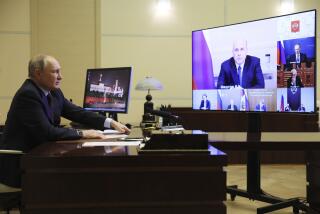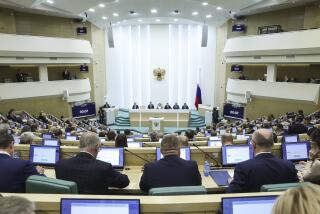2 Nuclear Test Pacts With Disputed Proviso Submitted to Senate
- Share via
WASHINGTON — The Reagan Administration, ending six years of resistance, submitted two old nuclear test limitation treaties to the Senate for its approval Tuesday, but with a reservation that should assure that the treaties will not become law for some time.
Frustrated Democrats on the Senate Foreign Relations Committee immediately attacked the White House proposal that would require a new agreement with the Soviets on verification provisions before the treaties could take effect.
That provision makes Senate action on the treaties alone “a meaningless exercise,” complained Sen. Paul Sarbanes (D-Md.). Sen. Claiborne Pell (D-R.I.), chairman of the Foreign Relations Committee, which is now in Democratic hands for the first time in six years, said the Administration proposal is “DOA (dead on arrival).”
But Administration officials replied that President Reagan was fulfilling the terms of a deal he made with Congress before last October’s Iceland summit. Reagan had agreed to submit the treaties, with the controversial reservation, in exchange for Congress’ killing several arms control resolutions that would have restricted his negotiating room at Reykjavik.
Also, according to Assistant Secretary of State H. Allen Holmes, Senate approval would be viewed as a “positive and stabilizing step” in U.S.-Soviet relations despite the reservation.
The Administration, meanwhile, continued struggling with the question of how to handle the issue of nuclear testing in its forthcoming congressionally mandated report on alleged Soviet violations of various arms control treaties.
Last year’s non-compliance report charged that Soviet nuclear tests have “likely violated” the limit of 150 kilotons (the equivalent of 150,000 tons of TNT) in the treaties, and the Pentagon wants to retain that allegation. However, the State Department and others have noted the inconsistency of accusing Moscow of cheating on treaties at the same time that it is asking the Senate for its “advice and consent” on the agreements.
The two agreements are the Threshold Test Ban Treaty (TTBT), signed by negotiators in 1974, and the Peaceful Nuclear Explosions Treaty, signed in 1976. They set a 150-kiloton ceiling on military and non-military blasts and provide for an exchange of related information.
But Reagan has repeatedly refused to begin the ratification process for the treaties because of the difficulties in estimating yield and because the authenticity of Soviet information could not be guaranteed.
The treaties, he said again Tuesday, “are not effectively viable in their present form.” U.S. methods to estimate the yield of Soviet tests contain “large uncertainties,” he added, so he asked the Senate to accept a reservation that requires a new on-site verification agreement with the Soviets before the treaties are law.
Such a verification agreement, the President told the lawmakers Tuesday, should provide “for direct, accurate yield measurements taken at the site of all appropriate nuclear detonations” to ensure no violation of the ceiling.
Sarbanes said this means that there must be an extended process of further negotiations and Senate review before a final agreement is signed into law.
Present seismic measurements of nuclear tests from afar can be in error by as much as 100% due to variations in geology and other conditions, meaning that a 150-kiloton blast can appear to be a 300-kiloton or a 75-kiloton shot, according to U.S. officials. A new “Corrtex” system, in which a coaxial cable is lowered into the test hole or a parallel hole to measure the blast, can reduce the error to 30%, U.S. scientists claim.
The Administration wants the Soviets to accept Corrtex, but the Kremlin has refused, in part because Corrtex would probably require on-site presence by Americans in the Soviet Union.
More to Read
Get the L.A. Times Politics newsletter
Deeply reported insights into legislation, politics and policy from Sacramento, Washington and beyond. In your inbox twice per week.
You may occasionally receive promotional content from the Los Angeles Times.










